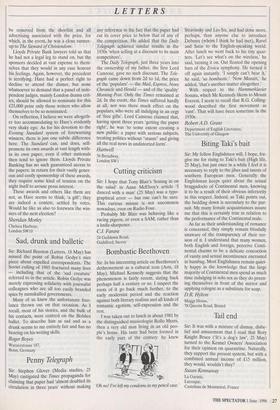Bombastic Beethoven
Sir: In his interesting article on Beethoven's dethronement as a cultural icon (Arts, 18 May), Michael Kennedy suggests that the phenomenon is fairly recent, dating back perhaps half a century or so. I suspect the roots of it go back much further, to the early modernist period and the reaction against both literary realism and all kinds of romantic egotism, self-expression and the rest.
I was taken out to lunch in about 1981 by the distinguished musicologist Rollo Myers, then a very old man living in an old peo- ple's home. His taste had been formed in the early part of the century: he knew 'Oh no! I've left my condoms in my pencil case.' Stravinsky and Les Six, and had done more, perhaps, than anyone else to introduce Debussy (whom I think he had met), Ravel and Satie to the English-speaking world. After lunch we went back to his tiny quar- ters. 'Let's see what's on the wireless,' he said, turning it on. Out floated the opening bars of the Eroica symphony. He turned it off again instantly. 'I simply can't bear it,' he said, 'so bombastic.' Now Mozart,' he added, 'that's another matter altogether.'
With respect to the Hammerk/avier Sonata, which Mr Kennedy likens to Mount Everest, I seem to recall that R.G. Colling- wood described the first movement as 'rant'. That will have been sometime in the 1930s.
Robert A.D. Grant
Department of English Literature, The University of Glasgow


























































 Previous page
Previous page